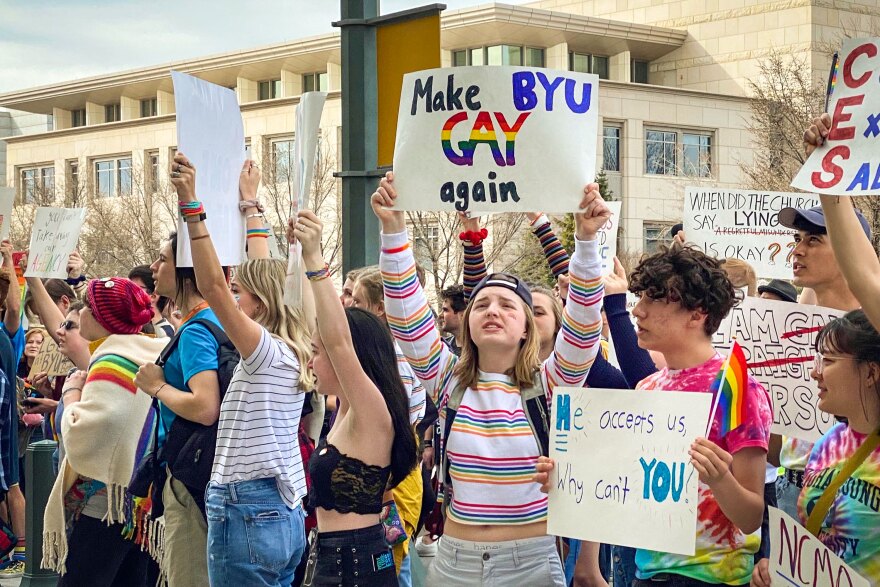In 2020, a section titled “homosexual behavior” was quietly removed from Brigham Young University’s Honor Code. The Church of Jesus Christ of Latter-day Saints, which owns the private university, later clarified that even if the wording was removed, the standard remained the same.
An updated Honor Code for 2023 has now added back language that explicitly prohibits staff and students from “same-sex romantic behavior,” among other changes. The code will also apply to students and staff at BYU-Idaho, BYU-Hawaii and Ensign College.
Whenever church education leaders reiterate the policies regarding same-sex relationships, Rachel Billings, a queer BYU senior and vice-president of the RaYnbow Collective, said she feels the message is always the same.
“Every time it just feels like someone’s showing me the door. Not telling me to leave, but showing me the door.”
The new code goes into effect on Aug. 30 and classes start Sept. 5. Billings said this reminder makes the first day of school feel “heavy.” Gracee Purcell, a lesbian student and president of the RaYnbow Collective, described it as having the same wound reopened over and over again.
“They kind of give some time in between for you to settle and be, like, ‘OK, I can work through this. I can be OK.’ And then they reaffirm that we’re [LGBTQ+ students] not welcome and it just starts all over again.
Both Purcell and Billings, however, said they appreciated that policies regarding LGBTQ+ students are clearer now than before.
“Obviously, we didn’t wish for it to be clear in this way and to have it be a negative thing,” Purcell said.
The previous Honor Code said students and staff must “live a chaste and virtuous life, including abstaining from any sexual relations outside a marriage between a man and a woman.”
The updated code reads “Live a chaste and virtuous life, including abstaining from sexual relations outside marriage between a man and a woman. Living a chaste and virtuous life also includes abstaining from same-sex romantic behavior.”
For Billings, it hurt to read that “living a chaste and virtuous life” was not compatible with “same-sex romantic behavior.”
“Even if it’s not compatible with the gospel, I do believe that it is compatible with being a virtuous person. That was some really strong phrasing,” Billings said.
The leaders of the RaYnbow Collective, the OUT Foundation and Understanding Sexuality, Gender, and Allyship — three groups focused on LGBTQ+ BYU students and alumni — issued a joint response. They said they saw a discrepancy between the “treatment of same-sex romantic behavior in the church handbook and its treatment at affiliated schools.”
The statement points to a speech that church President Russell M. Nelson gave in 2019. In talking about the church’s policies, Nelson said, “we also clarified that homosexual immorality would be treated in the eyes of the church in the same manner as heterosexual immorality.”
While the policy has not changed, Billings worries about how this reminder will affect her interactions with students and faculty.
“Every time something like this comes out, it empowers people who want to be hateful. I don’t think it makes new hateful people, but it empowers people who already are,” Billings said. “It makes me scared that students that I go to school with, or potentially faculty and staff members, might feel like I don't belong in their classes and might treat me as such because some have in the past.”
Jaclyn Foster is queer and graduated from BYU in 2018. They were not surprised by the update, but are concerned. Even before the language was taken out of the Honor Code three years ago, Foster said it seemed like BYU’s Honor Code Office was relaxing how it dealt with LGBTQ+ students. They’re worried about what this change signals.
“Even before that change in 2020, I think some queer students did feel comfortable being openly queer and not worrying so much that innocuous hugs were going to get them in trouble,” Foster. “We're not just returning to February 2020, it's about the trajectory of the retrenchment.”
Foster said LGBTQ+ students are likely feeling some extra stress and it's important they find a community where they can be supported.
“You want to have at least one place where you can process those feelings,” Foster said.
The church’s announcement of the updated Honor Code, reads “LGBTQ students are a welcomed and valued part of the campus community and share a common identity with every student as sons and daughters of God.”
The announcement adds, “Same-sex romantic behavior is not compatible with the principles included in the CES Honor Code. As in years past, each situation will be handled on a case-by-case basis to help each student feel the love of the Savior and to encourage them to live their gospel covenants and university/college commitments.”






